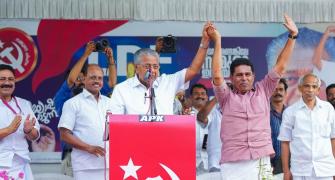The 10-member GoM, headed by the External Affairs Minister Pranab Mukherjee, will have its first meeting on August 14.
According to a Cabinet note moved to the GoM earlier this year, the government is looking at lowering the eligibility criteria for Indian carriers to fly on international route from the existing five years to three years.
Currently, Indian carriers looking to fly abroad have to show a minimum of five years continuous scheduled operations in the domestic sector. They also have to maintain a minimum fleet of 20 aircraft to be eligible to fly on international routes.
The proposed reduction of the eligibility criteria to three years would mean that a majority of domestic operators would become eligible to operate on international routes.
Also, the Indian government would reciprocally have to allow foreign airlines to operate air services to and from India leading to the availability of cheaper airline tickets for foreign destinations.
The GoM will also take up other important issues pertaining to the aviation sector like easing of rules for Indian airlines to fly abroad, creation of merchant airports, corporatisation of air traffic control system and sharing of airspace between civil and defence aircraft.
Major differences have emerged between the Air Force and the civil aviation ministry on the proposed new civil aviation policy. The Air Force has publicly expressed its displeasure for not being consulted at the drafting stage of the policy itself.
The defence ministry has raised several objections to the proposed civil aviation policy, including a move to release airspace meant exclusively for the Indian Air Force.
The ministry had said the policy should be converted to a "national aviation policy" rather than restricted to civil aviation sector.
In the June 15 Cabinet meeting at least eight Cabinet ministers opposed the policy and Pranab Mukherjee is believed to have raised concerns over air traffic congestion and had suggested the impact of modernisation of the Delhi and Mumbai airports should be examined before clearing the new proposed policy.
Another important proposal is opening up the Gulf route, which is currently the monopoly of Air India and Indian Airlines. The Gulf constitutes around 25 per cent of the AI's revenues and opening up the route would lead to the entry of a lot of carriers and massive competition in the sector.
Other proposals included allowing 100 per cent foreign direct investment in merchant ports, modernisation of 35 non-metro airports, change of the route dispersal guidelines, setting up the Airport Economic Regulatory Authority (AERA) for regulation of airport charges, separate licensing process for regional carriers, the corporatisation of the air traffic control and the amendment of the Aircraft Act 1934 to enhance the powers of the Directorate General of Civil Aviation.
Among them the enhancement of Aircraft Act 1934 has already been approved. The regional airline policy, through which a particular regional carrier will operate in any one of the regions north, west, south, east/northeast has already come into operation.








